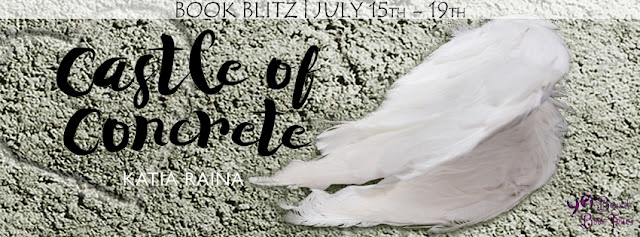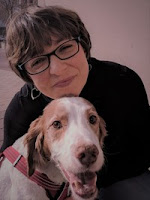Castle of Concrete
by Katia Raina
Genre:YA Historical Romance
Release Date: June 11th 2019
Summary:
In 1990-1991, when the history of Russia and the entire Soviet Union is being revisited and the rules are changing, a fifteen-year-old Jewish girl, Sonya Solovay, reunites with her dissident mother after twelve years of hiding out in Siberia–her life’s dream realized. Still, she sees herself as a typical Soviet citizen: a shy, quiet, obedient, barely-there girl, dissolving into the past, her country’s and her own. Determined to break into her new existence, Sonya tries out a shining new persona, but most of her efforts backfire. One mysterious boy notices her, wants to hear her stories, makes her feel like she is the shiniest part of his world. Everything else might as well fade away–her distant and hungry-for-gossip classmates, the equally shy Jewish friend who doesn’t always seem to understand her, the growing tension with her fiercely Jewish Mama, the rumors of an impending communist coup. More and more, Sonya spends time with her “rescuer” at a construction site she calls “castle.” So what if he uses an occasional anti-Semitic slur?
In the shadow of a crane, among metal pipes and concrete blocks, she finds it easy, falling, falling in love with a muddy-eyed boy she knows so little about. As for being Jewish in a country where the Republics are supposed to be “sisters” and the People brothers,” what does one’s nationality have to do with anything?
All the while, Sonya’s mama is falling in love also: she is falling in love with shiny America, a land where where being different seems to be celebrated, and not everyone is so very Russian and snow-white. The place sounds amazing, but so far away. Will Sonya ever find her way there?
Bus number 346 shakes our bones as it drives us along a patchy road. The air inside is nothing but fumes and breath. Space, too, is in short supply, a rare commodity like boots, refrigerators, bread, sausage, or just about anything. But Ruslan’s hand sliding down the sweaty railing and landing on mine at each traffic-light jolt more than compensates for these inconveniences of life.
I’ve never been on a date before.
A true one. The kind they write in books about.
Fellow passengers push their weight onto me. They shovetheir thick shoulders into my nose. I grin through their wrinkled faces. They look at my smile as though I’m touched, like my head has departed. Maybe I wouldn’t be smiling, either, if, like them, I was on my way to a hunt for fresh meat and socks in the capital, net sack at the ready.
In the inside pocket of my new pink leather jacket is a pair of second-row Moscow Concert Hall tickets. And my Jewish Star. I stuck it in there this morning, for, I don’t know, luck. For courage. Maybe I’ll show it to him today.
Not now, of course. Not in this angry crowd.
“How was, you know?” I wink at him, through all those people. “The secret thing?”
His hand stays on mine. His mouth moves to my ear. “It was good,” he whispers, his hot breath tickling me.
“Will there be more?”
He nods. His thin smile. How I’ve missed it.
“Maybe next time, you’ll take me?”
Demonstrations. That’s the best place to be in Moscow. Better than a concert hall. Better than the McDonald’s they have just built in the city center, where Ruslan promised to take me today, before my father’s show.
The growing crowd reshuffles yet again at the next stop. Hmph, a puff of salty-sour air flies toward me in a foul-smelling snort. It comes from an odd-faced man with pockmarked cheeks, his eyes glazed over. Even when the bus slows, the man can’t stand straight.
“What you gaping at?” he asks me, roughly.
Now I stare, transfixed, at the strange man’s yellow teeth. Ruslan tries to pulls me closer. But when the bus jumps over a pothole, the man leans into my face again. “Nice jacket,” he says.
“Just don’t look at him,” Ruslan hisses into my ear.
I turn my head away, and face instead a cranky-looking old man in a checkered cap, muttering, “Let me through! I’m an invalid! I’m a veteran!”
The man’s voice rises over the noisy shaking of the bus, about how he fought the Germans, got a bullet in his calf, and deserved a seat. The sour-smelling barely-standing drunk beside me tries to latch onto the sleeve of my jacket, but misses.
Arguments rise up slowly, thickening like the dust pouring out of the back of the bus, then settling over us like the soot covering the windows.
“What, you think she doesn’t deserve a seat?” A younger man with a thoughtful face points at a harried-looking woman with an empty net sack, whose shawl is falling off her shoulder. “She works all day, probably has a child to feed, no?”
“We deserve one, too, as we’ll be standing in line for McDonald’s for two hours at least, right?” I ask Ruslan cheerfully, earning scowls from all sides for us both.
“The country upside-down . . .” the veteran mutters, shaking his finger at me.
“McDonald’s . . . isn’t that nice?” the drunk echoes him.
“Hard-working . . . people . . . can’t find underwear in a store—not a sausage in a refrigerator . . .” His wavering voice grows. “. . . while some teenage Jid struts around in a pink leather jacket and stuffs herself at a McDonald’s restaurant.”
I clutch the railing, gritting my teeth hard. I don’t hear the rest of his nonsense, not after that word—not again—trailing me like a cursed shadow.
Heat covers my face. When I look at Ruslan’s, for a second I don’t recognize him. His eyes grow hard, as though something just closed within him.
“What did you just say to my girl, dumb asshole?” Ruslan wheezes.
“Ooooh, you love your little jid-ovochka, eh?”
Murmurs rise all around us. Ruslan gives the drunk a shove on the chest. The crowd behind the drunk shifts, and he staggers backward.
“What’s this country coming to?” the checkered-cap veteran says. He raises his index finger in the air and points it at me, at Ruslan, at the drunk, who is scrambling back up again.
“It’s the Jidy, I tell you,” the drunk slurs.
“I said, shut it, you fucking idiot!” His face completely unrecognizable now, Ruslan rushes headfirst at the drunk, though several pairs of arms restrain him. My heart hammering, I press against him. The young man with the nice face appears before us, standing tall, separating us from the drunk and the veteran, both.
“Calm down, comrades,” he says evenly.
Ruslan holds me under the arms like I am some kind of a doll, his hands so close to my chest on either side of me. I don’t move them aside. His breathing slows. “I won’t let anyone hurt you, myshka,” he whispers. Whom he is trying to soothe, himself or me, I do not know. “Sh-sh-sh,” he breathes into my ear, rocking me a little. “Don’t you mind him. I bet he’s on drugs. I bet he was hallucinating.”
And yet, somehow, the drunk saw right through me, Ruslan.
The doors of the bus jerk open, letting in fresh diesel-filled air. More people pile in at each stop, pile on top of me. They thaw the early autumn chill off each other’s bodies, breathing, coughing, sweating, smelling of smoke, trying to separate me from Ruslan in their fierce search for a better spot. But he keeps his hands on my waist, or at least I hope they’re his, holding me tight, saving me from the shifting crowd, shielding me from a drunk who blames everything on Jews. I tremble in his arms, less now from fear and more from the excitement of being his myshka. I am his girl, he said so. He said so.
About the Author
When she was a child, Katia Raina played at construction sites and believed in magic mirrors. She emigrated from Russia at the age of almost sixteen. A former journalist and currently a middle school English teacher in Washington, D.C., she has an MFA in Writing for Children and Young Adults from Vermont College of Fine Arts. She lives with her family just outside of D.C., and still believes in magic.










